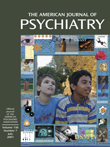Childhood Chronic Fatigue Syndrome
To the Editor: In spite of the medically unexplained nature of the condition, children with chronic fatigue syndrome and their parents often believe that the illness is primarily physical in nature. In adults the strength of these biological attributions has been linked to high levels of impairment and to poor outcome. Understanding illness attributions and health attitudes may help guide clinical practice in treating chronic fatigue syndrome in children.
As part of a follow-up study of adolescents with chronic fatigue syndrome, we explored health attributions and attitudes in 25 youngsters (15 girls and 10 boys) and their parents who were seen in tertiary pediatric centers a mean of 45.5 months (SD=21.5) after the start of their illness. The mean age at follow-up was 15 years (SD=2). Seventeen out of the 25 subjects had recovered, but eight remained ill. None had developed explanatory physical disorders (1). We compared health attitudes in the youngsters with chronic fatigue syndrome and in 15 healthy community comparison subjects.
The attributions of chronic fatigue syndrome were predominantly biological in the affected children and their parents and were related to outcome. Ninety percent of the children and 72% of the parents believed the illness was precipitated primarily by biological factors. Parental failure to subscribe to the possibility that psychological factors could be contributing to the maintenance of the disorder was associated with poor outcome (six of eight [75%] of the poor-outcome group and six of 17 [35%] of the good-outcome group; p=0.02, Fisher’s exact test).
In the youngsters with chronic fatigue syndrome, we found evidence of unrealistic views of normative fatigue levels. On an 11-point visual analogue scale (0=no fatigue), and regardless of recovery status, expected adolescent normative fatigue levels were significantly lower in the subjects with chronic fatigue syndrome (median=1.2, quartiles 0.5 to 1.5) and in their parents than in healthy comparison subjects (median=4.0, quartiles 3.0 to 4.5) (p=0.001, Mann-Whitney U test). Together with the documented tendency by children with chronic fatigue syndrome and their parents to underestimate the children’s actual levels of activity, this lends some support to the presence of distorted health perceptions or expectations.
These expectations were not found to be an expression of generalized overconcern about illness, pain, bodily function, and death on the Illness Attitudes Scale (2). This is in contrast to findings in a general population sample of young people with somatic symptoms (2). We did identify, however, a tendency in the subjects with chronic fatigue syndrome to enhance general “disease conviction” on the Illness Attitudes Scale (i.e., the belief in the presence of disease in spite of medical evidence and reassurance to the contrary). This was somewhat more intense in the recovered group (p=0.09, Mann-Whitney U test) and may represent enduring attitudes.
Our findings point to the importance of exploring selective health attitudes and expectations among children with chronic fatigue syndrome who are attending specialist pediatric clinics.
1. Rangel L, Garralda ME, Levin M, Roberts H: The course of severe chronic fatigue syndrome in childhood. J R Soc Med 2000; 93:129-134Crossref, Medline, Google Scholar
2. Eminson M, Benjamin S, Shortall A, Woods T: Physical symptoms and illness attitudes in adolescents: an epidemiological study. J Child Psychol Psychiatry 1996; 37:519-528Crossref, Medline, Google Scholar



